Energy Efficiency
Imperative: High-Efficiency Heat Pumps Save Energy

Are you exhausted from dealing with expensive energy bills? We offer a solution that can lower your costs and benefit the environment.
High-efficiency heat pumps are the answer. These innovative systems not only keep your home comfortable year-round, but also reduce energy consumption.
With their advanced technology and energy-efficient design, high-efficiency heat pumps are a smart choice for any homeowner.
Join us as we explore the benefits, workings, and cost-saving advantages of these remarkable systems.
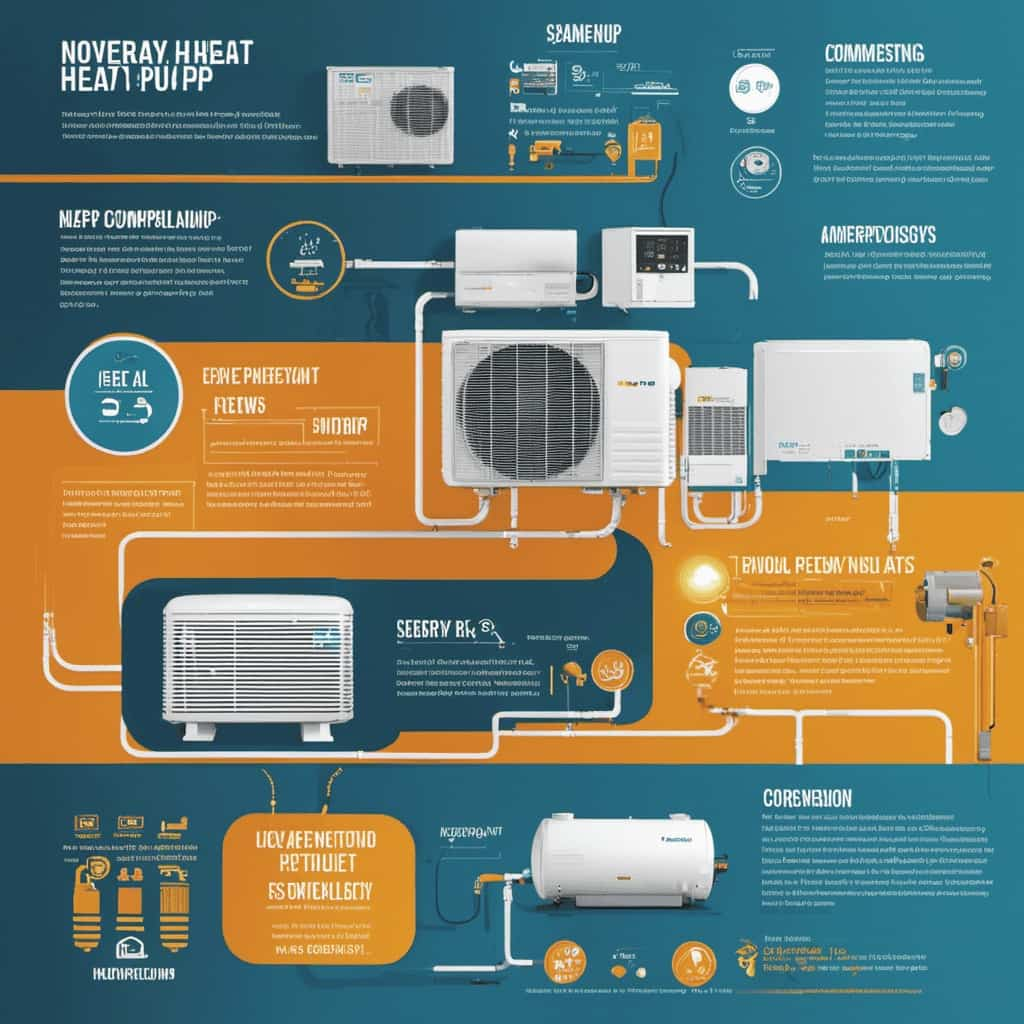
Let’s start saving together!
Key Takeaways
- High-efficiency heat pumps reduce energy consumption and result in lower utility bills.
- They help protect the environment by reducing greenhouse gas emissions.
- High-efficiency heat pumps improve indoor air quality by effectively filtering contaminants.
- Upgrading to high-efficiency heat pump systems can lead to significant energy savings and improved comfort.
The Advantages of High-Efficiency Heat Pumps
We love the cost savings and environmental benefits of high-efficiency heat pumps. Understanding the benefits of these systems is crucial in making informed decisions about energy usage.
High-efficiency heat pumps offer significant efficiency improvements compared to traditional heating systems. These pumps work by transferring heat from the outside air to the inside of a building, providing warmth even in colder temperatures.
By utilizing advanced technology, they can produce more heat with less energy consumption, resulting in reduced utility bills and a smaller carbon footprint. This increased efficiency not only saves money but also helps protect the environment by reducing greenhouse gas emissions.

High-efficiency heat pumps are an excellent option for those wanting to serve others and make a positive impact on the planet while enjoying the financial advantages they bring.
Understanding Energy Efficiency Ratings
To fully understand the benefits of high-efficiency heat pumps, it’s important to familiarize ourselves with energy efficiency ratings and how they can inform our decision-making process. Understanding energy efficiency standards is crucial in making informed choices about heating and cooling systems.
Here are some key points to consider:
-
Energy Efficiency Ratio (EER): This rating measures the cooling efficiency of the heat pump during peak summer conditions.

-
Seasonal Energy Efficiency Ratio (SEER): SEER calculates the cooling efficiency over an entire season, taking into account various weather conditions.
-
Heating Seasonal Performance Factor (HSPF): HSPF evaluates the heating efficiency of the heat pump during the heating season.
-
Coefficient of Performance (COP): COP measures the ratio of heat output to energy input, indicating the overall efficiency of the heat pump.
Exploring the impact of heat pump technology on energy consumption can guide us towards selecting high-efficiency models that save energy and reduce utility bills.

Now, let’s delve into how high-efficiency heat pumps work.
How Do High-Efficiency Heat Pumps Work
High-efficiency heat pumps work by utilizing a heat transfer mechanism to extract heat from the air, ground, or water and transfer it into the building. This process is achieved through the use of a refrigerant that evaporates at a low temperature, absorbing heat from the surroundings, and then condenses at a higher temperature, releasing the heat into the building.
Heat Transfer Mechanism
Let’s delve into how high-efficiency heat pumps effectively transfer heat. These devices employ various heat transfer mechanisms and efficiency factors to ensure optimal performance and energy savings. Here’s how they work:
-
Refrigerant Cycle: High-efficiency heat pumps utilize a closed-loop refrigerant cycle to transfer heat between the indoor and outdoor units. This cycle involves the compression, condensation, expansion, and evaporation of refrigerant, allowing the pump to absorb and release heat as needed.
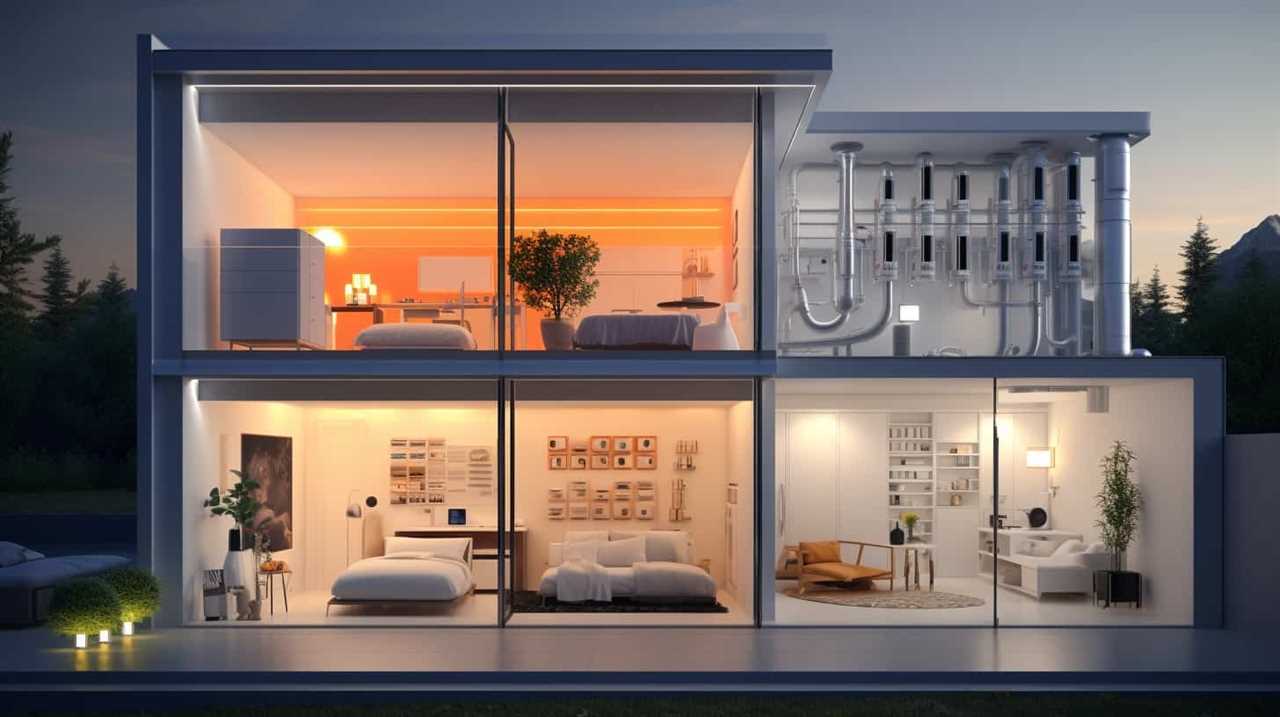
-
Heat Exchangers: Heat pumps incorporate heat exchangers, such as evaporators and condensers, to facilitate the transfer of heat between the refrigerant and the surrounding air or water. These components maximize heat transfer efficiency by utilizing large surface areas and efficient heat transfer materials.
-
Variable Speed Technology: High-efficiency heat pumps often feature variable speed compressors and fans, allowing them to adjust their operation based on the heating or cooling demand. This technology improves energy efficiency by reducing energy wastage during periods of low demand.
-
Smart Controls: Advanced heat pumps come equipped with smart controls that optimize performance and energy consumption. These controls monitor and adjust various parameters, such as temperature differentials and defrost cycles, to ensure efficient heat transfer and minimize energy consumption.
Energy Consumption Comparison
We can compare the energy consumption of high-efficiency heat pumps by examining their efficiency ratings and operating costs. High-efficiency heat pumps are designed to be energy efficient appliances, which means they consume less energy while delivering the same or even better heating and cooling performance compared to standard heat pumps. This not only helps in reducing energy bills but also reduces the carbon footprint by minimizing greenhouse gas emissions. To illustrate the energy savings potential, let’s compare the energy consumption of a high-efficiency heat pump with a standard heat pump.
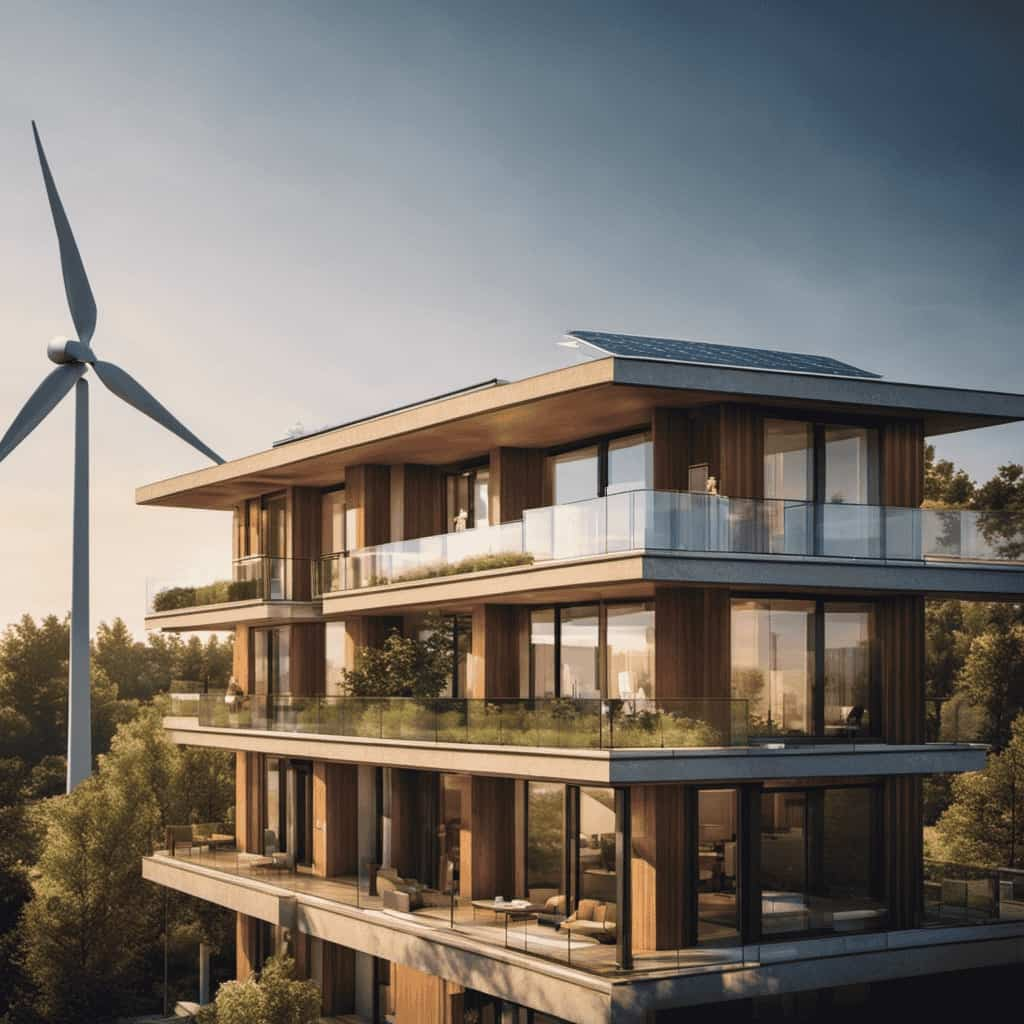
| Heat Pump Type | Efficiency Rating (SEER/AFUE) | Annual Operating Cost |
|---|---|---|
| High-Efficiency Heat Pump | 20 SEER / 10.0 HSPF | $800 |
| Standard Heat Pump | 13 SEER / 7.7 HSPF | $1,200 |
As you can see from the table, the high-efficiency heat pump has a higher efficiency rating, resulting in lower annual operating costs. By opting for energy-efficient appliances like high-efficiency heat pumps, you can not only save money but also contribute to reducing your carbon footprint.
Environmental Impact Assessment
By analyzing the environmental impact of high-efficiency heat pumps, we can assess how effectively they reduce energy consumption and greenhouse gas emissions. High-efficiency heat pumps offer several benefits in terms of reducing air pollution and carbon footprint:
-
Reduced Energy Consumption: High-efficiency heat pumps use advanced technology to transfer heat from the air or ground to heat or cool a space, resulting in lower energy consumption compared to traditional heating and cooling systems.
-
Lower Greenhouse Gas Emissions: Since high-efficiency heat pumps rely on electricity rather than burning fossil fuels, they produce fewer greenhouse gas emissions, helping to mitigate climate change.
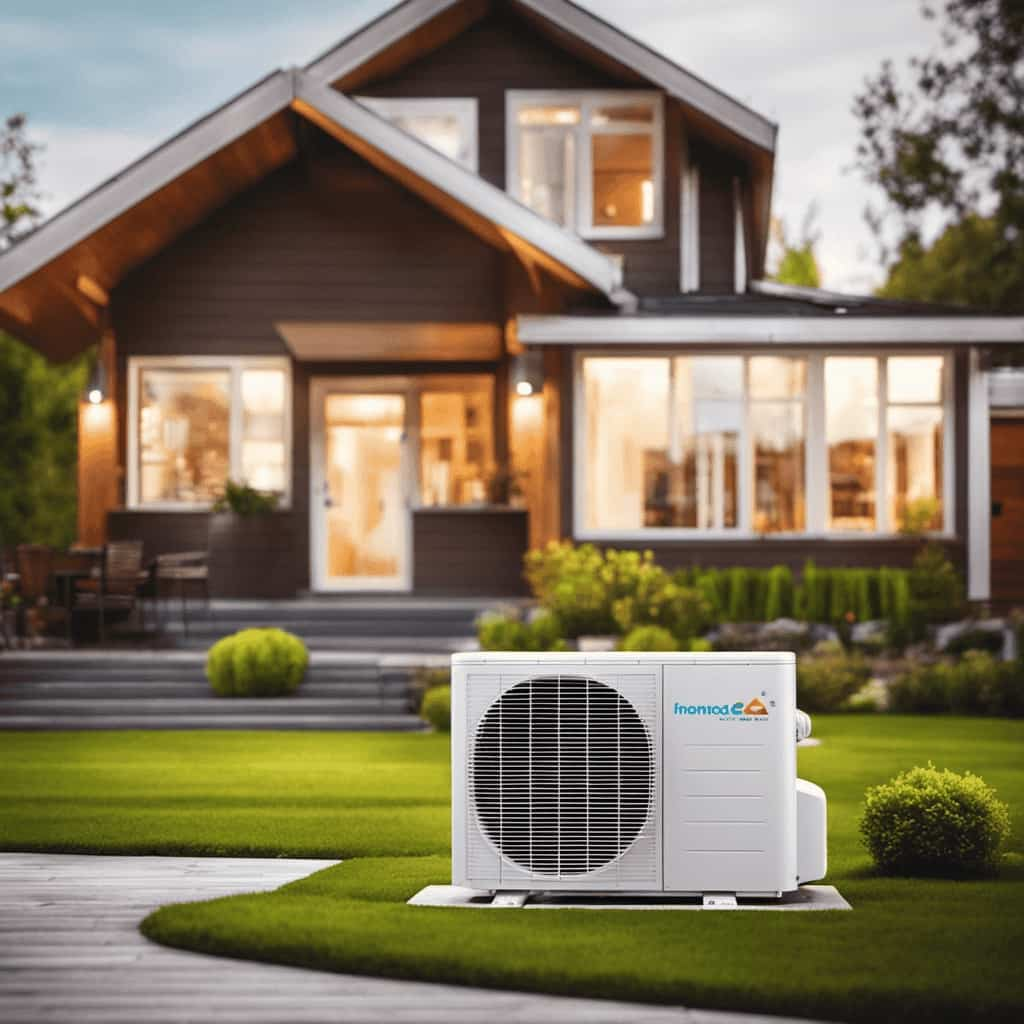
-
Improved Indoor Air Quality: These heat pumps utilize filters that capture and remove allergens, pollutants, and contaminants, leading to cleaner and healthier indoor air.
-
Renewable Energy Compatibility: High-efficiency heat pumps can be integrated with renewable energy sources like solar panels, further reducing reliance on non-renewable energy and decreasing environmental impact.
The Cost-Saving Benefits of High-Efficiency Heat Pumps
When it comes to the cost-saving benefits of high-efficiency heat pumps, there are several key points to consider.
Firstly, these heat pumps are designed to lower energy bills by using less electricity to provide the same level of heating or cooling as traditional systems.

Secondly, high-efficiency heat pumps contribute to environmental sustainability by reducing greenhouse gas emissions.
Lastly, investing in a high-efficiency heat pump can lead to long-term cost savings as they typically have a longer lifespan and require less maintenance compared to less efficient alternatives.
Lower Energy Bills
With high-efficiency heat pumps, our energy bills are significantly reduced over time. By investing in these energy-efficient appliances, we can enjoy the following cost-saving benefits:
-
Lower energy consumption: High-efficiency heat pumps use advanced technology to maximize energy efficiency, resulting in lower energy consumption compared to traditional heating systems.

-
Reduced monthly expenses: With lower energy bills, we can save a significant amount of money each month, allowing us to allocate those funds towards other important expenses or investments.
-
Long-term savings: Over time, the cost savings from using high-efficiency heat pumps can add up, providing us with substantial long-term savings on our energy bills.
-
Environmental benefits: By reducing our energy consumption, we’re also minimizing our carbon footprint and contributing to a healthier, more sustainable environment.
Investing in high-efficiency heat pumps not only saves us money but also aligns with our desire to serve others by being responsible stewards of the environment.

Environmental Sustainability
Investing in high-efficiency heat pumps can lead to substantial cost savings on our energy bills while promoting environmental sustainability. These heat pumps are designed to operate with exceptional efficiency, reducing the amount of energy required to heat and cool our buildings. By using less energy, we can minimize our carbon footprint and contribute to a cleaner, greener environment.
Additionally, high-efficiency heat pumps can be paired with renewable energy sources, such as solar or geothermal power, to further enhance their sustainability. This combination allows us to create energy-efficient buildings that rely on clean, renewable resources. By embracing these technologies, we not only save money but also play an active role in protecting the planet for future generations.
Transitioning from the discussion of environmental sustainability, let’s now explore the long-term cost savings associated with high-efficiency heat pumps.
Long-Term Cost Savings
We can achieve significant long-term cost savings by adopting high-efficiency heat pumps. These advanced heating systems not only reduce energy consumption but also offer additional benefits that contribute to long-term cost savings.
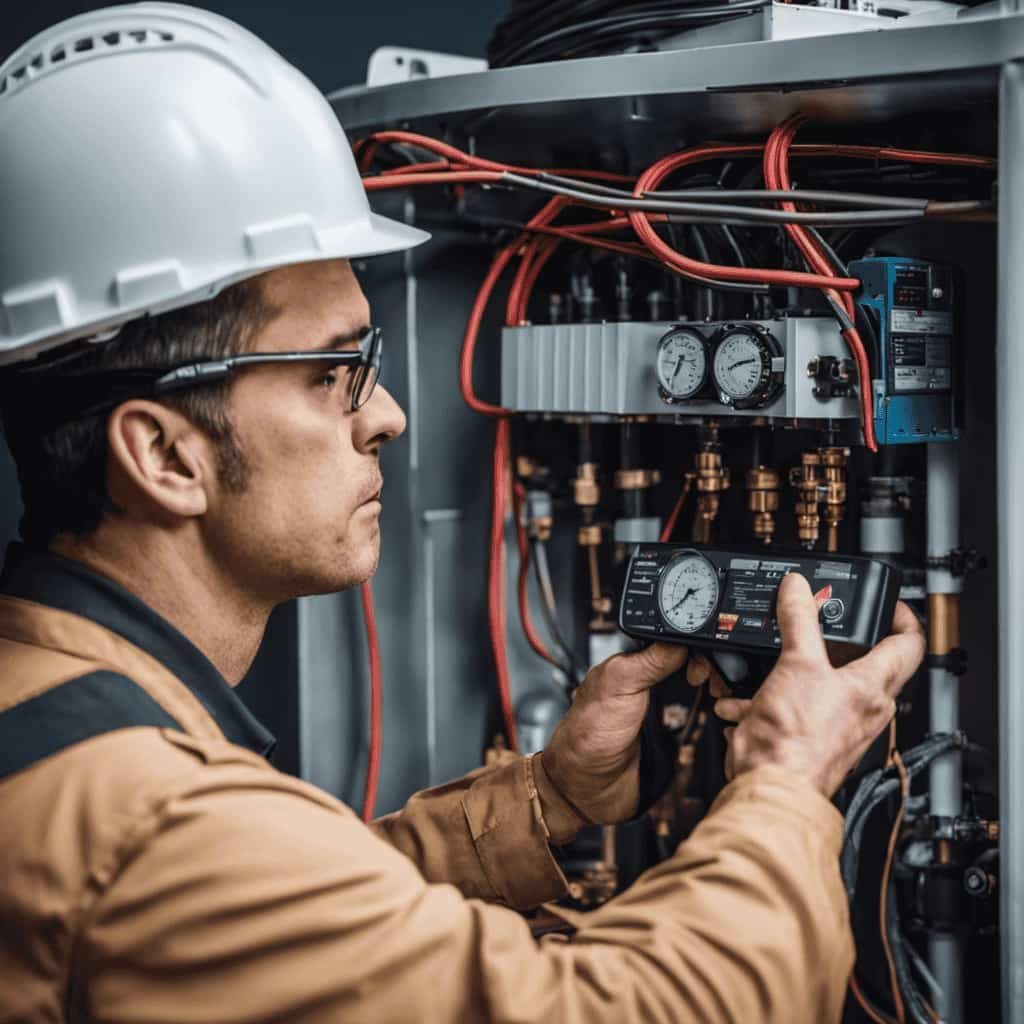
Here are some key reasons why high-efficiency heat pumps are a wise investment:
-
Reduced energy bills: High-efficiency heat pumps use less energy to provide the same level of heating, resulting in lower monthly energy bills.
-
Long-term maintenance savings: These heat pumps are built with durable components and require less maintenance over time, reducing long-term maintenance costs.
-
Increased home value: Installing a high-efficiency heat pump can increase the value of your home, providing a higher return on investment when selling.

-
Government incentives: Many governments offer financial incentives, such as tax credits and rebates, to encourage the adoption of high-efficiency heat pumps, further enhancing the cost-saving benefits.
Choosing the Right Size and Type for Your Home
To properly size and select the right heat pump for our home, we need to consider factors such as square footage, insulation levels, and climate conditions. Choosing the right type and size of heat pump is crucial for optimal performance and energy efficiency.
When selecting a heat pump model, it’s important to look for certain energy efficient features. One such feature is variable-speed technology, which allows the heat pump to adjust its speed according to the heating or cooling needs of the home. This not only ensures consistent comfort but also helps reduce energy consumption.
Another important feature is a high Seasonal Energy Efficiency Ratio (SEER) rating, which indicates the cooling efficiency of the heat pump. Additionally, considering the Heating Seasonal Performance Factor (HSPF) can help determine the heating efficiency.
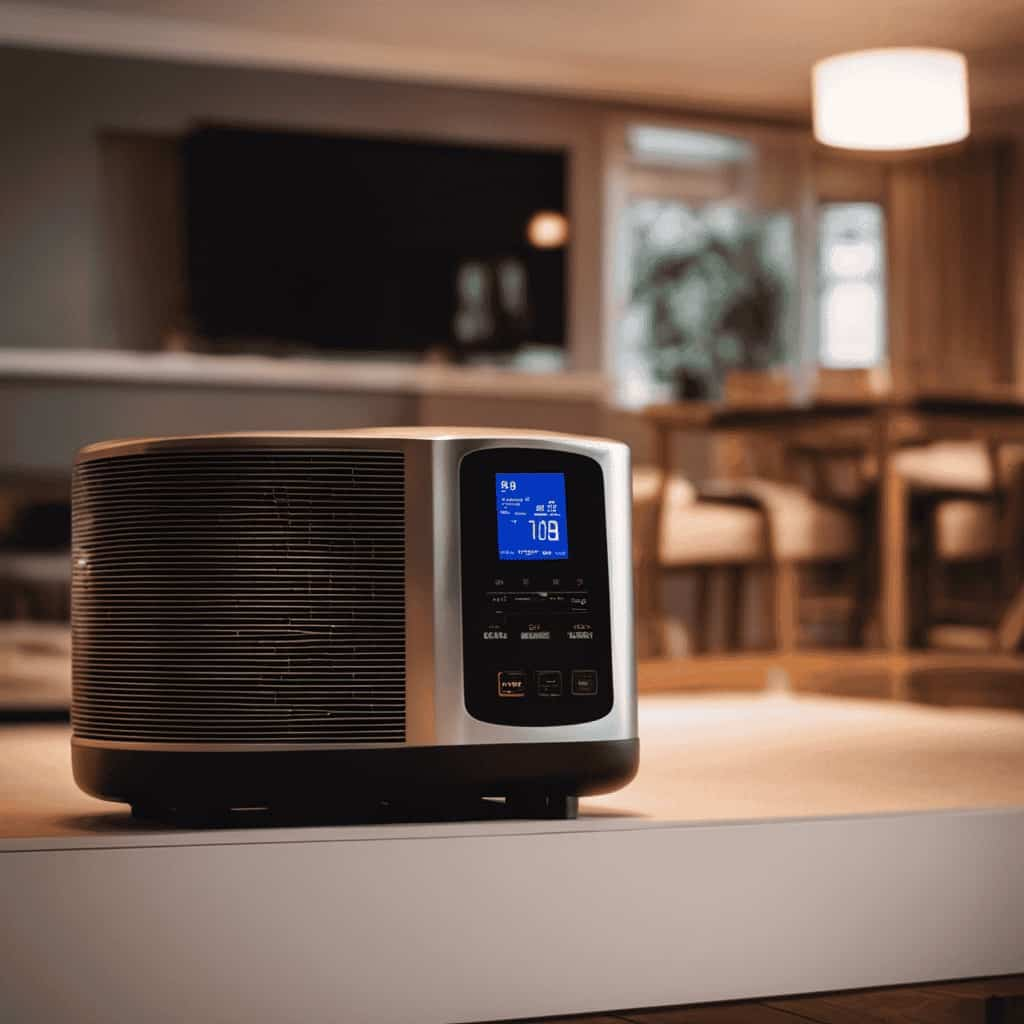
Enhancing Indoor Air Quality With High-Efficiency Heat Pumps
When it comes to enhancing indoor air quality, high-efficiency heat pumps offer several benefits.
First, these heat pumps can effectively filter out pollutants and allergens from the air, improving the overall air quality in your home.
Additionally, by continuously circulating and filtering the air, high-efficiency heat pumps can help reduce the presence of mold, bacteria, and other harmful microorganisms.
Lastly, advancements in heat pump technology have made them more energy-efficient, resulting in potential energy savings for homeowners.

Air Quality Benefits
How can high-efficiency heat pumps enhance indoor air quality?
-
Air Filtration: High-efficiency heat pumps are equipped with advanced filtration systems that can effectively remove dust, pollen, and other allergens from the air, improving indoor air quality and reducing the risk of respiratory issues.
-
Health Benefits: By removing harmful particles from the air, high-efficiency heat pumps can help prevent allergies, asthma attacks, and other respiratory problems. This can lead to improved overall health and well-being for individuals, especially those with pre-existing conditions or sensitivities.
-
Reduced Indoor Contaminants: Traditional heating systems may release combustion byproducts such as carbon monoxide into the indoor air, posing serious health risks. High-efficiency heat pumps eliminate the need for combustion, resulting in cleaner indoor air free from potentially harmful contaminants.
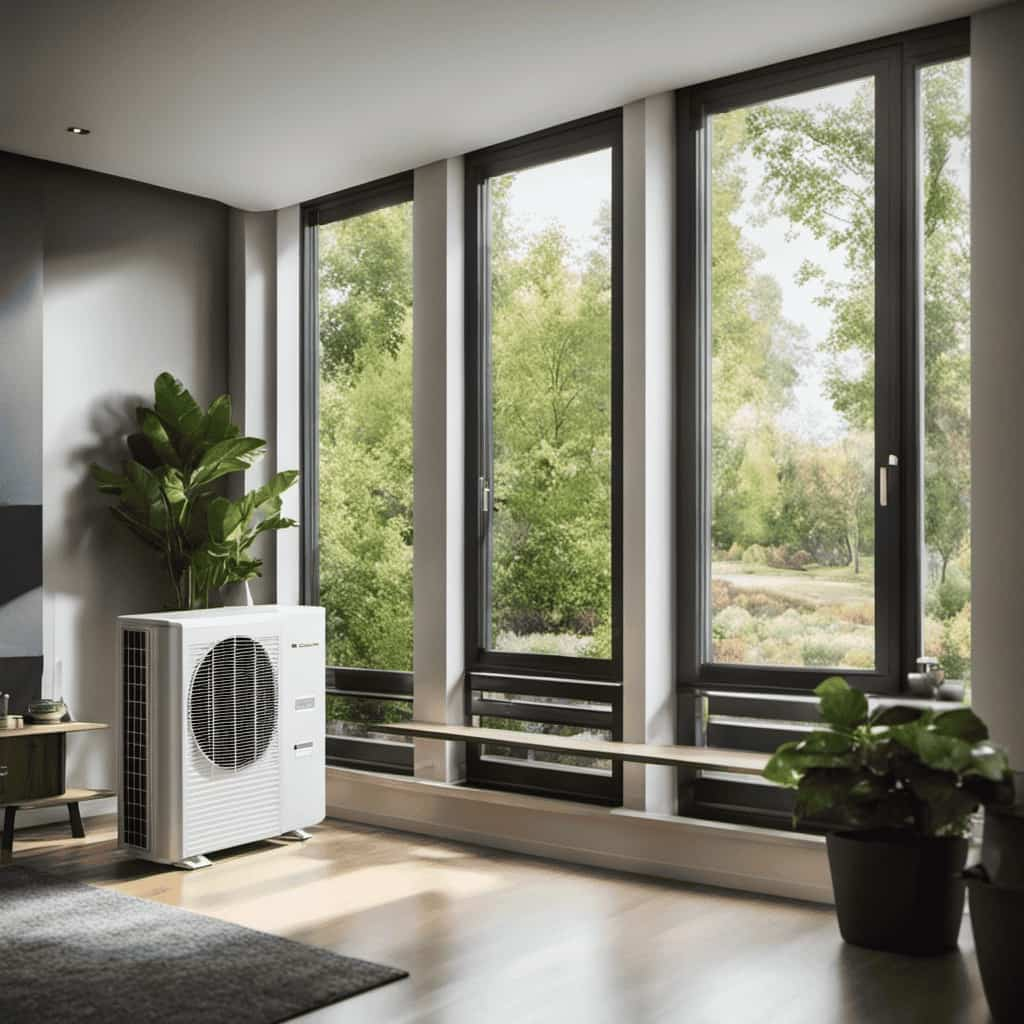
-
Ventilation: High-efficiency heat pumps can also provide controlled ventilation, bringing in fresh outdoor air and reducing the concentration of indoor pollutants. This promotes a healthier and more comfortable indoor environment.
Energy Savings Potential
We can enhance indoor air quality with high-efficiency heat pumps by reducing energy consumption and improving air filtration. High-efficiency heat pumps offer significant energy savings potential, making them an excellent choice for those looking to conserve energy and reduce their carbon footprint.
These heat pumps are designed to operate at a higher level of efficiency, converting a greater percentage of energy into heat, which results in lower energy usage. By using less energy, high-efficiency heat pumps not only save on utility bills but also contribute to a more sustainable future.
Additionally, these pumps improve air filtration by removing contaminants from the air, ensuring a healthier and cleaner indoor environment.

With their energy efficiency benefits and air quality enhancements, high-efficiency heat pumps are a smart investment for both homeowners and businesses.
Heat Pump Technology Advancements
Our high-efficiency heat pumps enhance indoor air quality and reduce energy consumption. With advancements in heat pump technology, we’re able to offer even more benefits to our customers. Here are some of the key advancements that contribute to the efficiency and innovation of our heat pumps:
-
Variable-speed compressors: These compressors allow the heat pump to adjust its output according to the heating or cooling demand, resulting in precise temperature control and improved energy efficiency.
-
Enhanced filtration systems: Our high-efficiency heat pumps incorporate advanced filtration technology, removing airborne particles, allergens, and pollutants from the indoor air, promoting healthier and cleaner living environments.
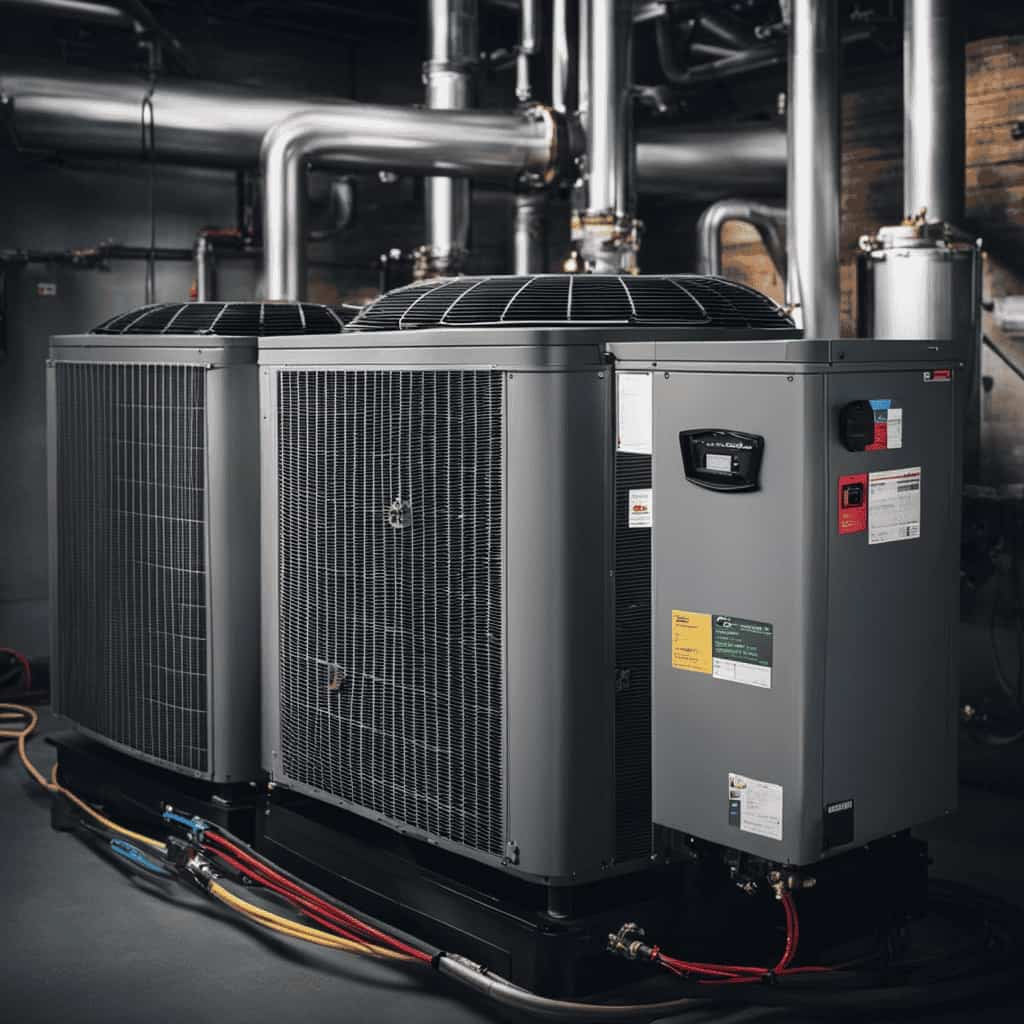
-
Smart thermostats: Heat pumps equipped with smart thermostats enable users to optimize their energy usage by programming temperature settings based on their preferences and occupancy patterns.
-
Improved refrigerants: By using environmentally-friendly refrigerants with lower global warming potential, our heat pumps contribute to sustainable and eco-friendly practices.
These heat pump efficiency advancements and heat pump technology innovations ensure that we can provide our customers with the best indoor air quality and energy-saving solutions available in the market.
Climate Considerations for High-Efficiency Heat Pump Installation
Installing high-efficiency heat pumps requires considering the climate. Climate change is a pressing issue, and as we strive to reduce greenhouse gas emissions, renewable energy solutions such as heat pumps play a crucial role. The effectiveness of heat pumps is greatly influenced by the climate in which they are installed.

To help you better understand the impact of climate on high-efficiency heat pump installation, take a look at the table below:
| Climate Type | Considerations |
|---|---|
| Cold | Proper insulation and sizing are essential to ensure optimal performance in colder climates. Heat pumps may require supplemental heating during extreme cold spells. |
| Moderate | Heat pumps perform well in moderate climates, providing efficient heating and cooling without the need for additional heating sources. |
| Hot | In hot climates, heat pumps primarily function as air conditioners, offering energy-efficient cooling. Proper maintenance is crucial to ensure optimal performance in high temperatures. |
| Humid | In humid climates, heat pumps should be equipped with dehumidification features to maintain indoor air quality and comfort levels. |
The Role of Insulation in Maximizing Energy Savings
To maximize energy savings, it’s crucial to have proper insulation and to use high-efficiency heat pumps. Insulation plays a vital role in maintaining a comfortable indoor temperature while minimizing energy consumption. Here are some key benefits of insulation:
- Energy efficiency: Insulation helps prevent heat transfer, reducing the need for excessive heating or cooling.
- Cost savings: By reducing energy usage, insulation can lead to significant savings on utility bills.
- Comfort improvement: Insulation helps maintain a consistent temperature, minimizing drafts and cold spots.
- Environmental impact: Insulation reduces greenhouse gas emissions by decreasing the reliance on fossil fuels for heating and cooling.
There are different types of insulation available, such as fiberglass, cellulose, and spray foam, each with its own unique properties and installation requirements. By choosing the right insulation and ensuring proper installation, homeowners can maximize energy savings and create a more sustainable living environment.
Now let’s explore how to maintain and service your high-efficiency heat pump.

Maintaining and Servicing Your High-Efficiency Heat Pump
Regular maintenance and servicing of our high-efficiency heat pump is essential for optimal performance and energy savings. By following a few simple steps, we can maximize efficiency and troubleshoot common issues.
First, it’s important to regularly clean or replace the air filters. Clogged filters can reduce airflow and put strain on the system, leading to decreased efficiency.
Additionally, we should inspect the outdoor unit for any debris or obstructions that could hinder its performance.
It’s recommended to schedule professional maintenance at least once a year to ensure the system is running smoothly and efficiently. During these visits, technicians will check refrigerant levels, inspect electrical connections, and clean the coils.
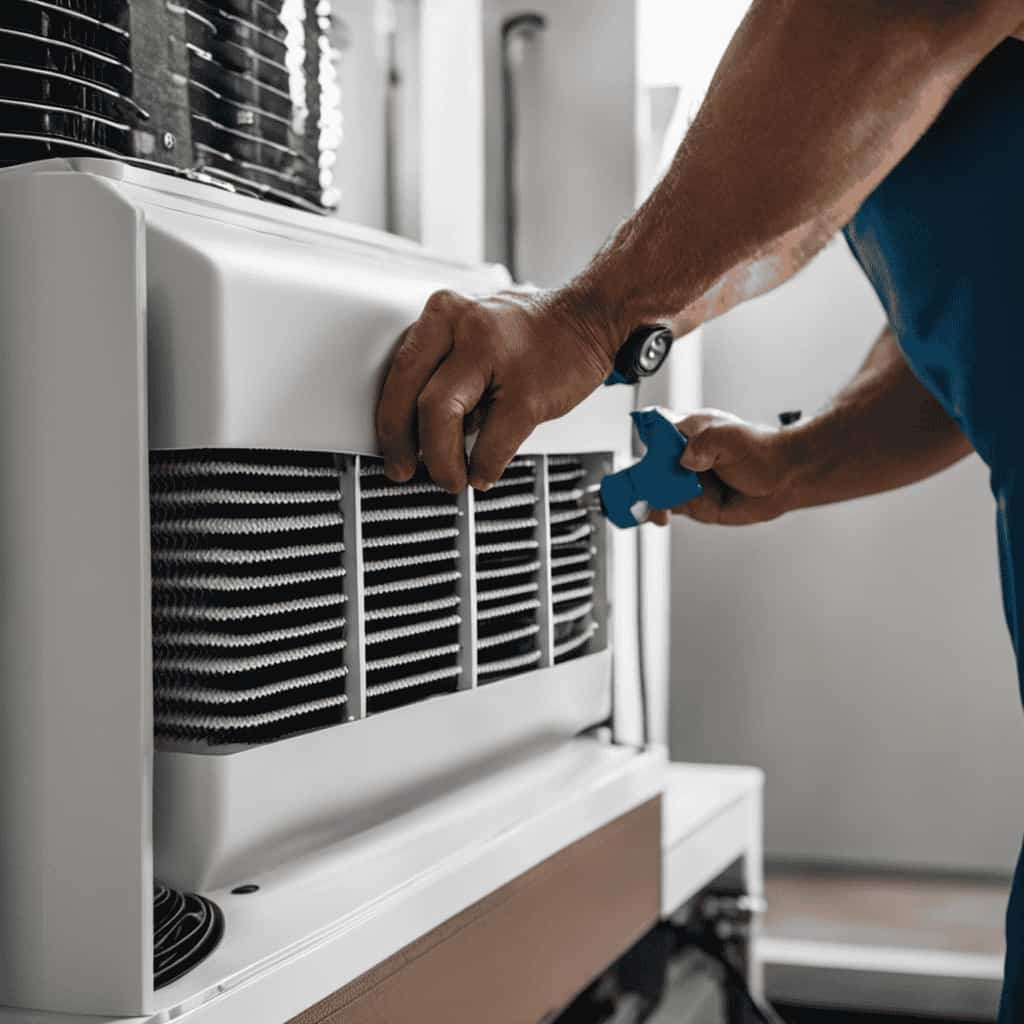
By taking these proactive measures, we can ensure our high-efficiency heat pump operates at its best, saving energy and reducing costs.
Now, let’s delve into comparing high-efficiency heat pumps to traditional HVAC systems.
Comparing High-Efficiency Heat Pumps to Traditional HVAC Systems
Occasionally, high-efficiency heat pumps outperform traditional HVAC systems, providing greater energy savings and improved comfort. When comparing high-efficiency heat pumps to traditional HVAC systems, there are several key factors to consider:
-
Heat pump efficiency: High-efficiency heat pumps have a higher coefficient of performance (COP) compared to traditional HVAC systems. This means they can produce more heat or cooling per unit of energy consumed, resulting in lower energy bills.
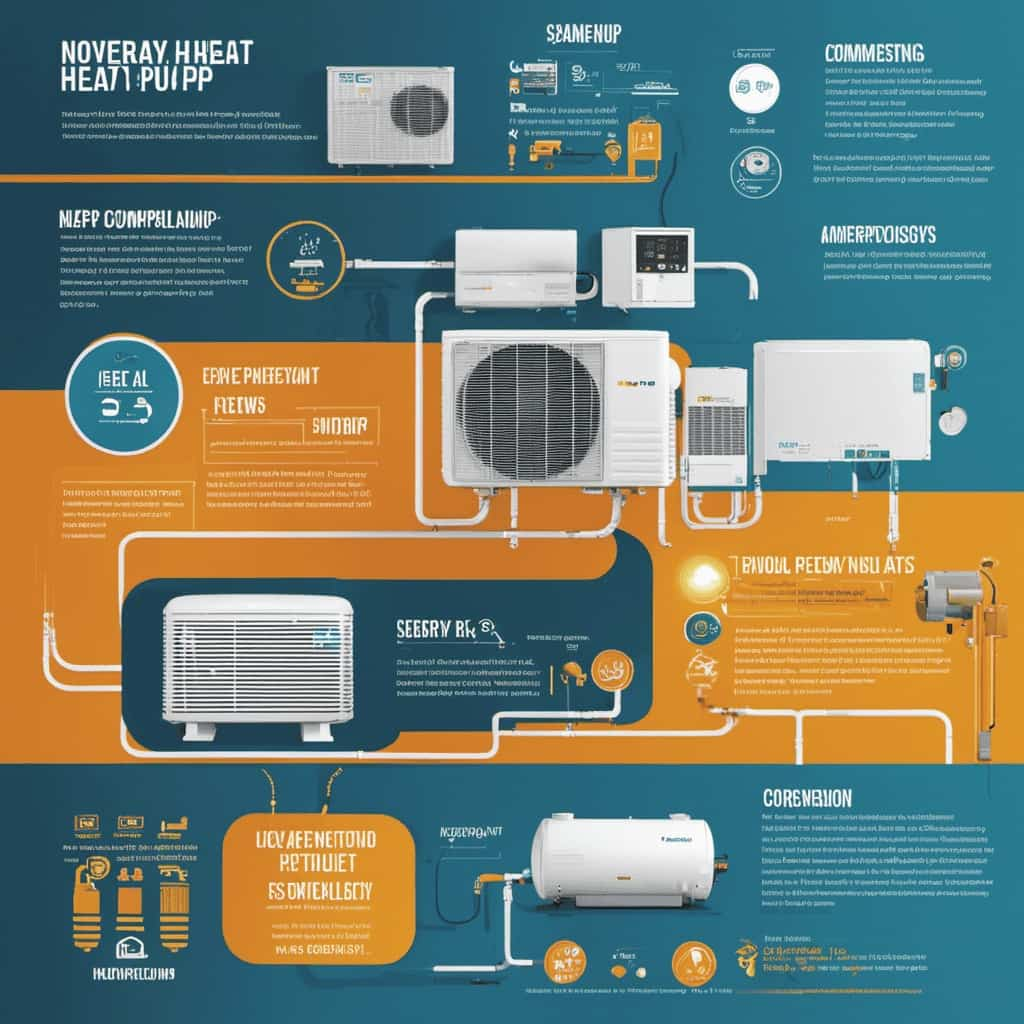
-
Energy savings: High-efficiency heat pumps can save up to 50% on heating and cooling costs compared to traditional HVAC systems. This significant reduction in energy consumption not only benefits the environment but also helps homeowners save money.
-
Improved comfort: High-efficiency heat pumps provide consistent and even heating or cooling throughout the home. They have variable speed motors that adjust output based on the desired temperature, ensuring optimal comfort levels at all times.
-
Environmental impact: High-efficiency heat pumps use refrigerants with lower global warming potential, reducing their impact on the environment compared to traditional HVAC systems.
Incentives and Rebates for High-Efficiency Heat Pump Upgrades
We can take advantage of several incentives and rebates available for high-efficiency heat pump upgrades, saving us money and encouraging energy-efficient choices. Many utility companies and government agencies offer these incentives to promote the adoption of high-efficiency heat pump systems, which can greatly reduce energy consumption and greenhouse gas emissions.

By upgrading to a high-efficiency heat pump, we not only maximize our savings through reduced energy bills but also contribute to a more sustainable future. These incentives and rebates can help offset the initial cost of purchasing and installing a high-efficiency heat pump, making it a more affordable option for homeowners.
By participating in these programs, we can make a positive impact on our environment while enjoying the benefits of an efficient heating and cooling system.
Now, let’s explore the process of making the switch: upgrading to a high-efficiency heat pump system.
Making the Switch: Upgrading to a High-Efficiency Heat Pump System
By researching different models and consulting with professionals, we can confidently make the switch to a high-efficiency heat pump system, ensuring maximum energy savings and improved comfort in our home.

Here are some important considerations to keep in mind during the upgrading process:
-
Size requirements: Properly sizing the heat pump is crucial for optimal performance. A professional can assess your home’s heating and cooling needs to determine the right size.
-
Ductwork evaluation: Existing ductwork may need to be inspected and possibly modified to accommodate the new heat pump system. This ensures efficient airflow throughout the house.
-
Electrical requirements: High-efficiency heat pumps may have different electrical needs compared to traditional systems. An electrician can assess your electrical panel’s capacity and make any necessary upgrades.
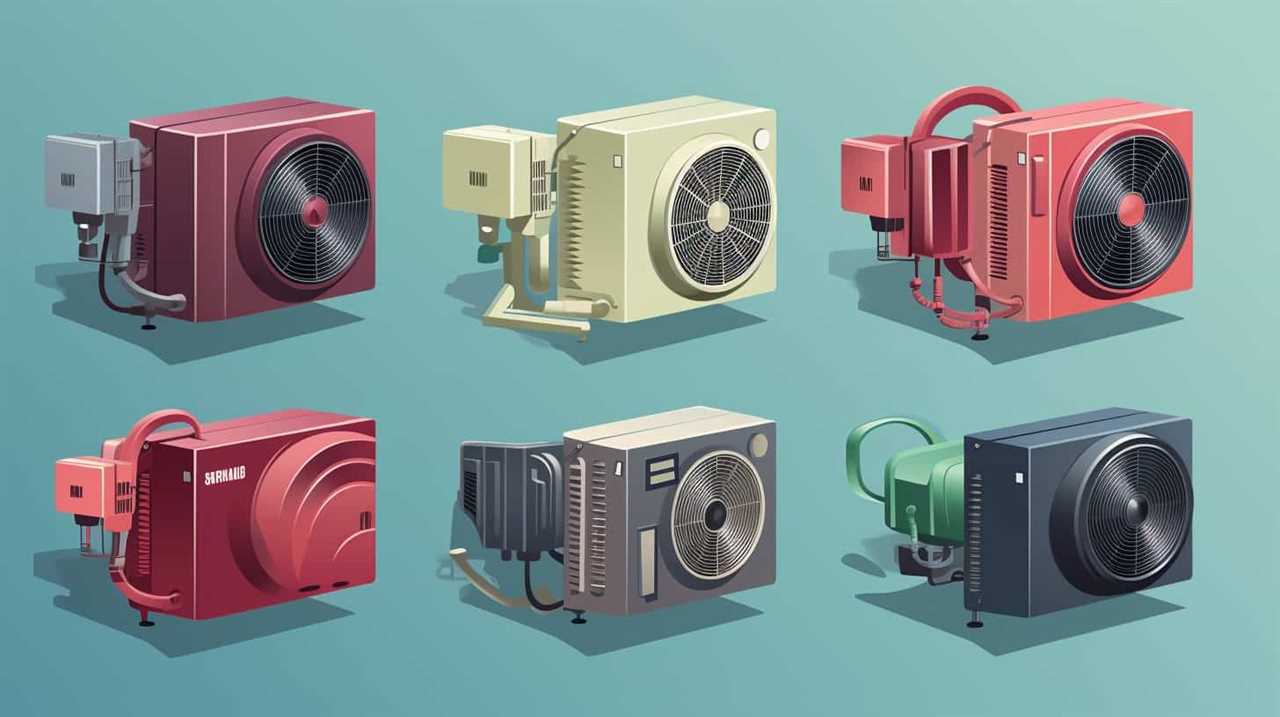
-
Outdoor unit placement: The outdoor unit should be strategically placed to minimize noise and maximize efficiency. Factors such as shading and accessibility should be considered during installation.
Frequently Asked Questions
How Long Does a High-Efficiency Heat Pump Typically Last?
On average, a high-efficiency heat pump typically lasts between 15 to 20 years. However, the lifespan can be influenced by various factors such as maintenance, usage patterns, and environmental conditions.
Are High-Efficiency Heat Pumps Suitable for All Types of Homes?
High-efficiency heat pumps offer cost-effective options for installing in all types of homes. Considerations for retrofitting older homes are necessary, but these pumps can save energy and serve others effectively.
Can a High-Efficiency Heat Pump Be Used for Both Heating and Cooling?
Yes, a high-efficiency heat pump can be used for both heating and cooling. It provides energy-saving benefits by efficiently transferring heat. Comparing the cost effectiveness, it is a great option for maintaining comfortable temperatures year-round.

Do High-Efficiency Heat Pumps Require Regular Maintenance?
Yes, high-efficiency heat pumps require regular maintenance to ensure optimal performance. Regular maintenance helps to identify and fix any issues, ensuring the heat pump operates efficiently and maximizes cost benefits and energy savings.
Are There Any Tax Credits or Incentives Available for Installing a High-Efficiency Heat Pump?
Tax credits and financial incentives may be available for installing a high-efficiency heat pump. These incentives can help offset the initial cost and make the investment more affordable for homeowners.
Conclusion
In conclusion, high-efficiency heat pumps offer a cost-saving solution for homeowners looking to reduce energy consumption. With their advanced technology and energy efficiency ratings, these systems provide significant benefits in terms of both comfort and savings.
By choosing the right size and type for your home, maintaining regular servicing, and taking advantage of incentives and rebates, upgrading to a high-efficiency heat pump system is a smart choice.

Make the switch today and experience the future of energy-efficient heating and cooling.
Energy Efficiency
Top Energy-Efficient Heat Pump Models Reviewed


We have completed the research and identified the best energy-efficient heat pump models for you.
Get ready to save on your energy bills and keep your home comfortable all year round.
In this article, we’ll be reviewing the Rheem RP20, Lennox XP25, Carrier Infinity 20, Trane XV20i, and Daikin Quaternity heat pumps.
These models are packed with advanced features and cutting-edge technology.
So, sit back, relax, and let us guide you through the world of energy-efficient heat pumps.
Key Takeaways
- The Rheem RP20, Lennox XP25, Carrier Infinity 20, and Trane XV20i are among the top energy-efficient heat pump models available.
- These models feature advanced technologies such as intelligent eye technology, 4-way airflow system, and advanced filtration system, which contribute to energy savings and improved indoor air quality.
- The Daikin Quaternity heat pump stands out for its high SEER rating, superior performance, and ability to handle extreme weather conditions.
- In addition to their innovative features, these heat pump models offer competitive pricing, long-term cost savings, and warranty coverage, making them an excellent choice for energy-efficient heating and cooling.
Rheem RP20 Heat Pump
The Rheem RP20 Heat Pump stands out as an energy-efficient option due to its exceptional performance and range of features. It offers advanced technology and innovative design, ensuring optimal comfort while minimizing energy consumption. The heat pump features a variable-speed motor that adjusts its speed according to the heating or cooling needs of the home, resulting in reduced energy usage and lower utility bills. Additionally, it is equipped with a two-stage compressor, allowing for more precise temperature control and enhanced efficiency. Overall, the Rheem RP20 Heat Pump is a reliable and energy-efficient solution that provides exceptional performance and comfort for any home.
Lennox XP25 Heat Pump
We found the Lennox XP25 Heat Pump to be an excellent choice for energy efficiency due to its innovative features and advanced technology.
Here are some key points that make the Lennox XP25 Heat Pump stand out:

- Variable-capacity operation allows for precise temperature control and reduced energy consumption.
- The XP25 is ENERGY STAR® certified, ensuring high energy efficiency and cost savings.
- It features a SilentComfort™ technology that minimizes noise levels for a quieter operation.
- The unit is equipped with a SunSource® Solar-Ready option, allowing you to harness the power of the sun for even greater energy savings.
- The XP25 comes with the iComfort® S30 smart thermostat, which provides precise temperature control and advanced programming capabilities.
With its cutting-edge technology and energy-efficient design, the Lennox XP25 Heat Pump offers a reliable and cost-effective solution for maintaining a comfortable home environment while reducing energy consumption.
Now, let’s move on to the next heat pump model: the Carrier Infinity 20 Heat Pump.
Carrier Infinity 20 Heat Pump
Now let’s take a look at the Carrier Infinity 20 Heat Pump, which offers exceptional energy efficiency and advanced features. The Carrier Infinity 20 heat pump is known for its impressive energy-saving capabilities and innovative technologies. It is designed to provide optimal comfort while reducing energy consumption.
Here is a table highlighting the pros and cons of the Carrier Infinity 20 heat pump:

| Pros | Cons |
|---|---|
| Excellent energy efficiency | Higher upfront cost |
| Quiet operation | Requires professional installation |
| Advanced features for enhanced comfort | Limited availability of parts |
The Carrier Infinity 20 heat pump incorporates several energy-saving features, including variable-speed technology, which allows the unit to adjust its output based on the heating or cooling demands, resulting in lower energy consumption. Additionally, it utilizes a two-stage compressor, which helps maintain consistent temperatures and reduces energy usage.
In the next section, we will discuss the Trane XV20i heat pump and its energy-efficient features.
Trane XV20i Heat Pump
Let’s dive into the features of the Trane XV20i Heat Pump, known for its energy efficiency and innovative technology. Here is an analysis of its efficiency and a cost comparison:
Efficiency Analysis:

- The Trane XV20i boasts a SEER (Seasonal Energy Efficiency Ratio) rating of up to 22, making it highly efficient in both heating and cooling modes.
- It also has a HSPF (Heating Seasonal Performance Factor) of up to 10, ensuring efficient heat production during colder months.
- With its variable-speed compressor, the XV20i adjusts its output based on the current temperature and demand, optimizing energy usage.
- The unit’s ComfortLink™ II communicating technology allows for precise control and coordination with other HVAC components, further enhancing efficiency.
- The TruComfort™ technology ensures consistent and even temperatures throughout the home, reducing energy wastage.
Cost Comparison:
- While the initial cost of the Trane XV20i may be higher than some other models, its energy efficiency can lead to significant long-term savings on utility bills.
- The variable-speed compressor and precise control capabilities enable the XV20i to operate at lower speeds for longer durations, resulting in reduced energy consumption.
Transitioning into the subsequent section about the ‘daikin quaternity heat pump’, another top energy-efficient model worth exploring is…
Daikin Quaternity Heat Pump
Moving on to the Daikin Quaternity Heat Pump, let’s explore its features and energy efficiency.
The Daikin Quaternity is a highly efficient heat pump model that offers a wide range of benefits. It comes equipped with advanced features such as intelligent eye technology, which detects human presence and adjusts the temperature accordingly to save energy. The Quaternity also boasts a unique 4-way airflow system that ensures even distribution of warm or cool air throughout the room.

In terms of energy efficiency, the Quaternity has a high SEER rating of up to 20.6, making it one of the most efficient heat pumps on the market. When compared to other Daikin heat pump models, the Quaternity stands out for its superior performance and innovative features.
As for pricing, the Daikin Quaternity is competitively priced, offering excellent value for money.
Frequently Asked Questions
What Is the Average Lifespan of These Heat Pump Models?
On average, the lifespan of these heat pump models is around 15-20 years. However, it is important to note that proper maintenance is crucial to ensure the longevity of the unit. Regular servicing and cleaning can significantly extend its lifespan.
Do These Heat Pump Models Come With a Warranty?
Yes, these heat pump models come with a warranty. We understand that warranty coverage is important to guarantee customer satisfaction. Rest assured, our reviewed models offer reliable warranties to protect your investment.

Are These Heat Pump Models Eligible for Any Energy Efficiency Rebates or Incentives?
Yes, these heat pump models are eligible for energy efficiency rebates and incentives. They offer significant energy savings compared to traditional heating methods, making them a cost-effective and environmentally-friendly choice.
Can These Heat Pump Models Be Used in Both Residential and Commercial Settings?
Yes, these heat pump models can be used in both residential and commercial settings. When considering cost, it’s important to note that residential applications typically have lower energy demands compared to commercial settings.
Are These Heat Pump Models Compatible With Smart Home Technology?
Yes, these heat pump models are compatible with smart home technology. They offer seamless smart home integration, allowing users to control and monitor their energy-saving features remotely, providing convenience and efficiency for both residential and commercial settings.
Conclusion
After reviewing the top energy-efficient heat pump models, it’s clear that each of them offers impressive performance and cost savings.

However, one statistic that stands out is the Rheem RP20 Heat Pump’s Seasonal Energy Efficiency Ratio (SEER) rating of up to 20.5. This means it’s highly efficient in cooling and heating, helping homeowners save on energy bills.
Overall, these models provide excellent options for those looking to improve their home’s energy efficiency.
Energy Efficiency
Boost Your Heat Pump Energy Efficiency Effortlessly

Let’s crank up the efficiency of our heat pumps with minimal effort!
In this article, we’ll explore simple yet effective ways to enhance the energy efficiency of your heat pump.
From understanding efficiency ratings to optimizing placement and size, we’ll cover it all.
We’ll also dive into the importance of regular maintenance, smart thermostat technology, and alternative heating methods.

Get ready to maximize your heat pump’s performance effortlessly.
Key Takeaways
- Understanding heat pump efficiency ratings: SEER rating measures cooling efficiency, HSPF rating measures heating efficiency, higher SEER and HSPF ratings indicate better efficiency and greater energy savings.
- Implementing proper heat pump sizing and placement: Proper insulation reduces heat loss, well-insulated homes require smaller heat pumps, consider noise levels and airflow when placing the heat pump, install it away from direct sunlight and heat sources for improved performance and energy efficiency.
- Regular maintenance and cleaning for optimal performance: Clean or replace air filters every 1-3 months, check and clean the outdoor unit twice a year, schedule professional maintenance annually, remove debris and obstructions around the outdoor unit, dust and vacuum the indoor unit regularly.
- Utilizing smart thermostat technology: Smart thermostats optimize energy efficiency by adjusting the temperature based on heating preferences, allowing for temperature scheduling and remote control, offering energy-saving modes and real-time energy usage data, maximizing efficiency and reducing energy costs effortlessly.
Understanding Heat Pump Efficiency Ratings
As we delve into the topic of understanding heat pump efficiency ratings, it’s important to grasp the significance of these ratings in maximizing energy savings. Heat pump SEER (Seasonal Energy Efficiency Ratio) ratings and HSPF (Heating Seasonal Performance Factor) ratings play a crucial role in determining the efficiency of a heat pump.
The SEER rating measures the cooling efficiency of the heat pump, while the HSPF rating measures its heating efficiency. A higher SEER rating indicates better cooling efficiency, while a higher HSPF rating indicates better heating efficiency. Understanding these ratings helps us make informed decisions when choosing a heat pump, as a higher rating means greater energy savings.
By considering both SEER and HSPF ratings, we can ensure that our heat pump operates efficiently throughout the year.
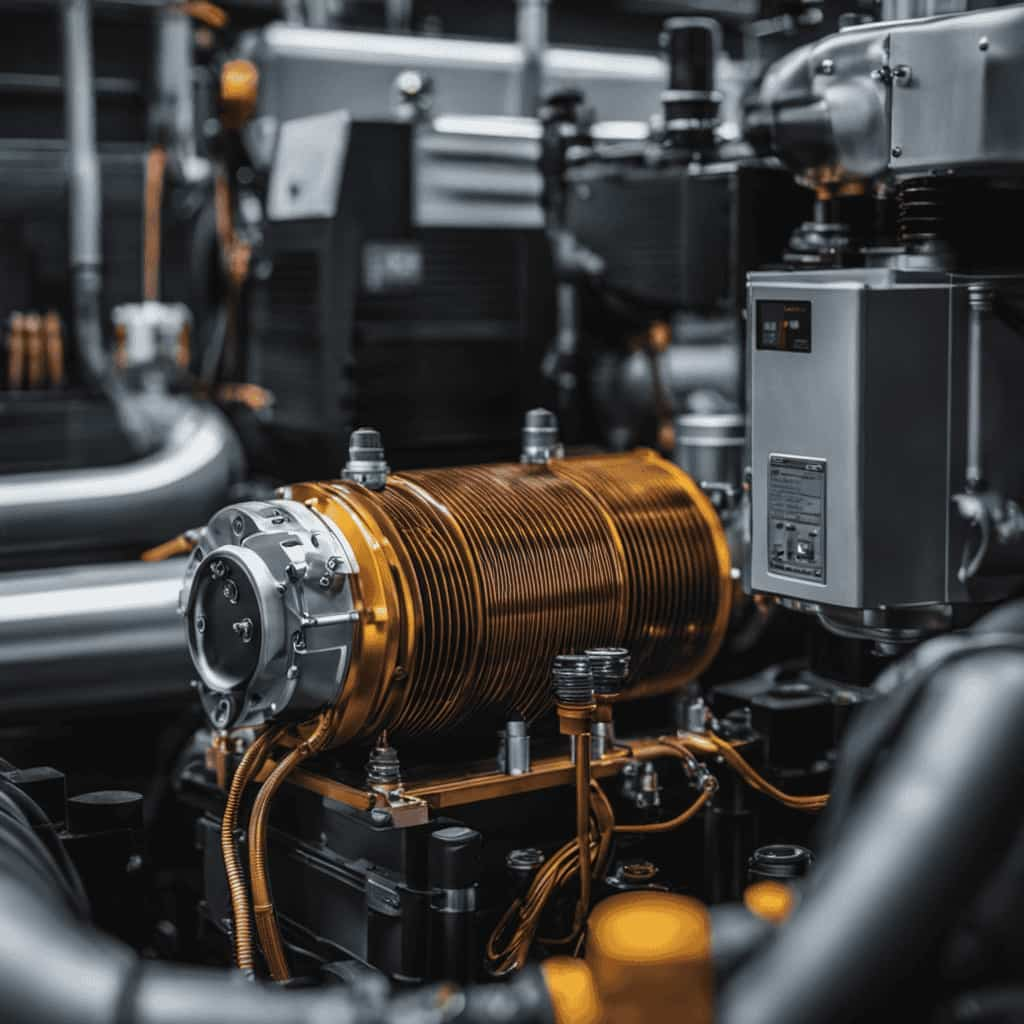
Now, let’s explore how implementing proper heat pump sizing and placement further enhances energy efficiency.
Implementing Proper Heat Pump Sizing and Placement
To ensure optimal energy efficiency, we must carefully determine the correct size and placement of our heat pump. Proper insulation is key to reducing heat loss and ensuring that the heat pump operates efficiently. A well-insulated home will require a smaller heat pump, saving both energy and money.
When it comes to placement, it’s important to consider factors such as noise levels and airflow. The heat pump should be installed in a location that allows for proper air circulation and easy access for maintenance. Additionally, placing the heat pump away from direct sunlight and sources of heat can help prevent overheating and improve its performance.
Regular Maintenance and Cleaning for Optimal Performance
We should regularly maintain and clean our heat pump to ensure optimal performance. By following a maintenance checklist and utilizing effective cleaning techniques, we can prolong the lifespan of our heat pump and maximize its energy efficiency.

Here is a simple maintenance checklist to keep in mind:
| Task | Frequency |
|---|---|
| Clean or replace air filters | Every 1-3 months |
| Check and clean outdoor unit | Twice a year, in spring and fall |
| Schedule professional maintenance | Annually |
In addition to regular maintenance, proper cleaning techniques are essential. Here are some tips:
- Clean the outdoor unit: Remove any debris or leaves around the unit and keep it clear of obstructions to promote proper airflow.
- Clean the indoor unit: Dust and vacuum the indoor unit regularly to prevent dirt buildup that can hinder performance.
- Clean the coils: Use a soft brush or cloth to gently clean the coils, removing any dirt or debris.
Regular maintenance and cleaning will ensure that your heat pump operates at its best. In the next section, we will explore the benefits of utilizing smart thermostat technology.
Utilizing Smart Thermostat Technology
By integrating smart thermostat technology into our heating system, we can optimize energy efficiency and effortlessly control our heat pump.

Smart thermostats provide advanced features that help improve energy consumption and optimize temperature control. These devices can learn our heating preferences and adjust the temperature accordingly, ensuring that our heat pump operates at its most efficient level.
With the ability to program temperature schedules and remotely control the thermostat through smartphone apps, we can easily regulate our heat pump’s operation even when we’re not at home.
Additionally, smart thermostats offer energy-saving modes and provide real-time energy usage data, allowing us to make informed decisions about our energy consumption.
With the use of smart thermostat technology, we can maximize our heat pump’s efficiency and reduce our energy costs effortlessly.

Supplementing Heat Pump Usage With Alternative Heating Methods
Using a few alternative heating methods in conjunction with our heat pump can significantly improve its energy efficiency. Here are some options to consider:
-
Geothermal Heating Benefits:
-
Harness the stable temperature of the earth to provide consistent and efficient heating.
-
Reduce electricity consumption by up to 70% compared to traditional heating systems.

-
Enjoy long-term cost savings and lower carbon emissions.
-
Solar Panel Integration:
-
Install solar panels to generate renewable energy for both heating and electricity needs.
-
Reduce reliance on the grid and lower utility bills.

-
Take advantage of government incentives and tax credits for solar installations.
Frequently Asked Questions
Can I Increase the Energy Efficiency of My Heat Pump by Using Renewable Energy Sources?
Yes, we can increase the energy efficiency of our heat pump by using renewable energy sources. Incorporating solar or geothermal power can reduce reliance on traditional energy and maximize efficiency.
What Are Some Common Mistakes to Avoid When Sizing and Placing a Heat Pump?
When it comes to sizing and placing a heat pump, it’s important to avoid common mistakes. By following best practices, you can ensure optimal efficiency and performance for your heat pump.
Is It Necessary to Hire a Professional for Regular Maintenance and Cleaning of My Heat Pump?
Regular heat pump maintenance by professionals ensures optimal performance and longevity. However, cost-effective DIY cleaning can also be beneficial. It’s important to keep filters clean, check for leaks, and ensure proper airflow for maximum energy efficiency.

How Can a Smart Thermostat Help Improve the Energy Efficiency of My Heat Pump?
A smart thermostat can improve the energy efficiency of our heat pump by utilizing features like programmable schedules and remote control. Integrating our heat pump with a smart thermostat maximizes comfort and reduces energy waste.
Are There Any Government Incentives or Rebates Available for Using Alternative Heating Methods Alongside a Heat Pump?
Yes, there are government incentives and rebates available for using alternative heating methods alongside a heat pump. These incentives encourage the use of renewable energy sources and can help lower your energy costs.
Conclusion
In conclusion, by understanding heat pump efficiency ratings, properly sizing and placing the unit, performing regular maintenance and cleaning, and utilizing smart thermostat technology, you can effortlessly boost your heat pump’s energy efficiency.
Additionally, considering alternative heating methods can further supplement the usage of your heat pump.

By implementing these strategies, you can save energy and maximize the performance of your heat pump, ultimately leading to a more cost-effective and eco-friendly heating solution.
Energy Efficiency
Understanding the Economics of High-Efficiency Heat Pumps

We have exclusive information about the economics of high-efficiency heat pumps. Prepare to analyze the cost-benefit ratio, assess the return on investment, and discover government incentives.
Our article will break down the factors affecting the economic viability of these innovative systems. Whether you’re a homeowner or a business owner, understanding the numbers behind high-efficiency heat pumps is crucial for making informed decisions.
So, let’s crunch some numbers and uncover the economic advantages of these energy-saving powerhouses.
Key Takeaways
- Conducting an economic analysis is crucial for informed decision-making.
- High-efficiency heat pumps offer significant long-term savings.
- Energy savings and reduced environmental impact contribute to a positive return on investment.
- Government incentives and financing options improve economic viability.
The Importance of Economic Analysis in High-Efficiency Heat Pump Installation
We believe that when considering high-efficiency heat pump installation, it’s crucial to conduct an economic analysis.

Economic considerations play a pivotal role in determining the long-term savings and overall cost-effectiveness of such installations.
By conducting a thorough economic analysis, one can assess the upfront costs, operational expenses, and potential savings associated with high-efficiency heat pumps.
This analysis allows for an informed decision-making process, ensuring that the chosen heat pump system aligns with the desired outcomes and budgetary constraints.
Evaluating the economic viability of high-efficiency heat pump installation involves considering factors such as energy efficiency ratings, maintenance costs, and potential utility rebates or incentives.

Additionally, the analysis should assess the projected lifespan of the heat pump system to determine the long-term savings and return on investment.
Understanding the Cost-Benefit Ratio of High-Efficiency Heat Pumps
Our analysis of the cost-benefit ratio shows that high-efficiency heat pumps offer significant long-term savings and a favorable return on investment.
When considering the cost effectiveness of high-efficiency heat pumps, it’s important to look beyond the initial upfront costs. While high-efficiency heat pumps may have a higher initial investment compared to traditional heating systems, the energy savings they provide over time more than make up for this difference.
These heat pumps are designed to operate with maximum efficiency, utilizing advanced technology to minimize energy consumption. This results in lower monthly utility bills, leading to substantial savings over the lifespan of the heat pump.

Additionally, the reduced energy usage helps to decrease the environmental impact, making high-efficiency heat pumps an innovative and sustainable choice for heating and cooling needs.
Factors Affecting the Economic Viability of High-Efficiency Heat Pump Systems
Factors such as energy prices, installation costs, and government incentives play a crucial role in determining the economic viability of high-efficiency heat pump systems.
Energy consumption is a key consideration when evaluating the economic feasibility of these systems. High-efficiency heat pumps are designed to minimize energy usage by efficiently transferring heat from one place to another. By reducing energy consumption, homeowners can significantly lower their utility bills, making the investment in a high-efficiency heat pump system more financially attractive.
Additionally, the environmental impact of high-efficiency heat pumps must be taken into account. These systems produce fewer greenhouse gas emissions compared to traditional heating systems, contributing to a greener and more sustainable future.

Evaluating the return on investment for high-efficiency heat pump installation requires careful consideration of these factors. With lower energy consumption and reduced environmental impact, high-efficiency heat pumps offer a promising solution for both cost savings and environmental stewardship.
Evaluating the Return on Investment for High-Efficiency Heat Pump Installation
When evaluating the return on investment for high-efficiency heat pump installation, it’s important to consider various factors such as energy savings, installation costs, and potential government incentives.
High-efficiency heat pumps offer significant energy savings compared to traditional heating systems. By efficiently transferring heat from the air or ground, these pumps can reduce energy consumption and lower utility bills. Additionally, high-efficiency heat pumps provide long-term benefits by reducing greenhouse gas emissions and promoting sustainability.
While the initial installation costs may be higher than conventional systems, the energy savings over time can offset this expense. Moreover, government incentives such as tax credits or rebates can further enhance the return on investment.

In the following section, we’ll explore government incentives and financing options for high-efficiency heat pumps, which can further improve the economic viability of these systems.
Exploring Government Incentives and Financing Options for High-Efficiency Heat Pumps
To further enhance the economic viability of high-efficiency heat pumps, we’ll now explore government incentives and financing options available. These incentives and financing options can significantly reduce the upfront costs of installing a high-efficiency heat pump system, making it more accessible and affordable for homeowners and businesses alike.
Here are five options to consider:
-
Government grants: Many governments offer grants or financial assistance programs to promote the adoption of energy-efficient technologies, including high-efficiency heat pumps. These grants can help offset the initial investment and encourage more people to switch to these energy-saving systems.

-
Tax credits: Some jurisdictions provide tax credits or deductions for the purchase and installation of high-efficiency heat pumps. These credits can help reduce the overall cost of the system and provide additional savings for the homeowner or business.
-
Low-interest loans: Financial institutions and government agencies often offer low-interest loans specifically for energy-efficient upgrades, including high-efficiency heat pumps. These loans provide favorable terms and repayment options, making it easier to finance the installation of these systems.
-
Energy efficiency programs: Many utility companies offer energy efficiency programs that provide incentives for customers to upgrade to high-efficiency heat pumps. These programs may include rebates, discounts, or other financial incentives to encourage the adoption of energy-saving technologies.
-
Power purchase agreements: In some cases, homeowners or businesses can enter into power purchase agreements with third-party providers. These agreements allow the customer to pay for the energy produced by the high-efficiency heat pump system, rather than the upfront cost of the equipment itself. This can provide a more affordable and flexible financing option.

Frequently Asked Questions
How Does the Efficiency of a High-Efficiency Heat Pump Compare to Traditional Heating Systems?
High-efficiency heat pumps outperform traditional heating systems in terms of efficiency and cost. By utilizing advanced technology, these pumps can achieve higher levels of efficiency, resulting in significant energy savings and lower utility bills.
Are There Any Maintenance or Repair Costs Associated With High-Efficiency Heat Pumps?
Maintenance and repair costs for high-efficiency heat pumps are important factors to consider. Regular maintenance can help prevent major issues, but occasional repair expenses may arise. These costs should be factored into the overall economics of the system.
Can High-Efficiency Heat Pumps Be Used in Both Residential and Commercial Buildings?
Yes, high-efficiency heat pumps can be used in both residential and commercial buildings. They offer energy-efficient heating and cooling solutions for various applications, making them a versatile choice for innovative and sustainable HVAC systems.
Are There Any Environmental Benefits to Using High-Efficiency Heat Pumps?
Using high-efficiency heat pumps has significant environmental benefits. They reduce greenhouse gas emissions and contribute to energy savings. These pumps are a sustainable and innovative solution for both residential and commercial buildings.

What Factors Should Be Considered When Choosing the Right Size High-Efficiency Heat Pump for a Specific Space?
When choosing the right size high-efficiency heat pump, several factors should be considered. These include the square footage of the space, insulation levels, climate conditions, and desired temperature settings.
Conclusion
In conclusion, understanding the economics of high-efficiency heat pumps is crucial for making informed decisions. By analyzing the cost-benefit ratio and evaluating factors such as installation costs, energy savings, and government incentives, we can determine the economic viability of these systems.
With their potential for significant return on investment and the availability of financing options, high-efficiency heat pumps offer a promising solution for efficient and cost-effective heating and cooling.
Embrace the power of these systems and unlock a world of economic benefits.

-

 Residential and Commercial Applications7 months ago
Residential and Commercial Applications7 months agoBest Amana Heat Pump Reviews
-

 Thermal Energy Transfer7 months ago
Thermal Energy Transfer7 months agoBreakthroughs in Modern Heat Pump Systems: Thermal Energy Edition
-

 Geothermal Heat Pumps6 months ago
Geothermal Heat Pumps6 months agoInnovative Geothermal Heat Pump Manufacturers Revolutionize Energy Efficiency
-

 Residential and Commercial Applications7 months ago
Residential and Commercial Applications7 months agoBest Heat Pump
-

 Geothermal Heat Pumps6 months ago
Geothermal Heat Pumps6 months agoUpgrade Your Comfort with Our Efficient HVAC Systems
-

 Air Conditioning5 months ago
Air Conditioning5 months agoExploring Energy-Efficient Air Conditioning Heat Pumps
-

 Energy Consumption4 months ago
Energy Consumption4 months ago10 Key Comparisons: Heat Pump Vs Traditional Heating
-

 Thermal Energy Transfer4 months ago
Thermal Energy Transfer4 months agoBoost Your Heat Pump Efficiency: Interactive Guide








